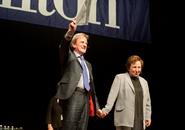
After spending the day on campus visiting classes and talking with Hamilton students, this year’s Sacerdote Great Names Series speakers, Nobel Peace Prize laureates Dr. Bernard Kouchner and Shirin Ebadi, took to a stage in the Margaret Bundy Scott Field House on April 24 to address a gathering of the Hamilton community and guests.
The event began with opening remarks by Professor of Global Political Theory and former U.S. Ambassador Edward Walker ’62 who took the opportunity in his introduction to pay homage to Hamilton’s own Nobel Peace Prize winner, Elihu Root, class of 1864, who received the Nobel Peace Prize approximately 100 years ago in 1912. Following this reflection, Walker provided accolades for the two Nobel Peace Prize winners as he described Bernard Kouchner’s role in the founding of Medecins Sans Frontieres (Doctors Without Borders) and Shirin Ebadi’s career of activism for human rights in Iran.
Bernard Kouchner spoke first, recalling a time when “you were not allowed to help others” because arbitrary lines on a map could stop medical help from reaching those in the global community who needed it most. As an organization, Doctors without Borders describes its purpose in its name, yet Kouchner spoke at length about the more complicated progression of events that was necessary to make the mere existence of such an organization possible.
Before Doctors Without Borders, it was accepted fact that governments could regulate international efforts of humanitarian aid within their own borders even in the face of great suffering. Kouchner saw this as a great injustice, asserting his own beliefs that suffering knows no borders and that doctors must be allowed to seek out those who need help. Realizing that practicing his beliefs required laws to be changed, Kouchner entered French politics and worked his way to the United Nations.
For the “youngsters” in the audience, he offered some strong advice in suggesting “if you want to change the law, you must be in the law.” Kouchner’s political career culminated with the passing of resolutions by the General Assembly of the United Nations granting humanitarian organizations a right of access to those needing help and mandating governments to permit such actions.
These resolutions not only made organizations like Doctors without Borders possible but also ushered in a new approach to alleviating global suffering.
Shirin Ebadi spoke next, using her time to not only emphasize the importance of peace, but of seeking sustainable peace. She began with a thought provoking exercise by asking the audience what the difference is between a house that is lost in war and house that is lost in poverty; what the difference is between a life lost to a bullet and a life lost to a lack of clean drinking water.
Peace, Ebadi clarified, is not simply the absence of war, it is also the assurance of human dignity. Looking at her native country of Iran, Ebadi pointed out how her home country is not at war, yet it is also not at peace. Lacking social justice and democracy, she described the Iranian government as running its own political agenda, free from the true opinions and desires of its people. The recent tension between the United States and Iran is a cause for concern Ebadi conceded, but we should not mistake it as representing the true relationship that might be shared between Americans and Iranians as people. She highlighted the many strong connections our countries already share and her hope that, despite the effects of misleading polls and propaganda, the Iranian people will continue with their slow progression towards social justice, democracy and, eventually, sustainable peace.
Following both speakers’ remarks, Ambassador Walker returned to moderate a discussion with the two laureates over questions posed by the Hamilton community. Among the topics covered were the role of economics in political conflicts, the relevancy of the Nobel Peace Prize in the modern world and if an individual truly has any potential to make a difference.
After sharing their thoughts with the audience, both Kouchner and Ebadi received a standing ovation. They graciously stuck around after the stage had cleared to meet with and talk to Hamilton students, proving once again the great value in the Sacerdote Series. Not only are these events an amazing opportunity to hear from remarkable individuals, they also provide a chance for genuine interaction and a more complete exchange of ideas.
Posted April 25, 2013
